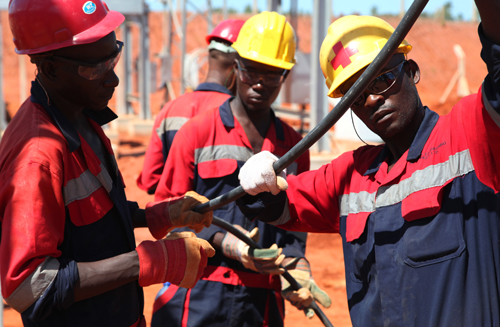
As the vast majority of experts, analysts and economic observers will attest, the mining sector offers the African country of Kenya the highest immediate growth potential, with its development expected to contribute significantly to driving economic growth in various industries including energy, construction, transportation and finance.
At the heart of the country’s long-term mining plans is the Kwale Mineral Sands Project. Located 50 kilometres south of the port city of Mombasa, it is a highly competitive project in a sector with a significant forecast supply shortfall widely thought to emerge in the medium term. Indeed it is estimated that the Kwale Project will go on to contribute some $300 million to the government of Kenya in direct tax and royalty payments alone over the 13 year life of the mine.
“The project,” explains Joe Schwarz, General Manager of External Affairs, “was first initiated back in the mid-1990s by the Canadian company Tiomin Resources, which carried out the initial exploration, environmental, re-settlement and feasibility work. After a number of years of moving the project forward, Tiomin suffered a series of setbacks until an acquisition agreement with the publically listed Australian company Base Resources was concluded in July 2010.”
With the deal complete, and with the backing of the Kenyan government, Base Resources registered a wholly-owned Kenyan subsidiary, Base Titanium. It is this local entity in which the Kwale Project assets exist as its flagship development. Following a positive update of the feasibility study, and the successful raising of equity and debt financing, the $300 million project was officially launched in late 2011.
Wholly focused on the Kwale Project, Base Resources has evolved massively in a very short period of time, going from a small exploration outfit to a sizeable business with a market capitalisation of over $200 million and a member of the ASX 300.
Construction of the project is now well advanced, with practical completion scheduled for the third quarter of 2013. By the end of the year Base Titanium expects to have commenced shipping of three distinct product streams processed from the mine’s high-value, heavy-mineral assemblage. Going forward, it will produce 330,000 tonnes of ilmenite, 80,000 tonnes of rutile and 30,000 tonnes of zircon annually over a 13-year period.
Base Titanium aims to become a truly Kenyan mining company and one that brings both economic and social benefits to the communities in which it operates. “Our focus,” Schwarz enthuses, “is on delivering sustainable, long-term community investment. We are developing further programmes for the future and the pay back is that we gain the co-operation and support of a contented and uplifted community.”
As the operator of the first large-scale mining project to be developed within Kenya, Base Titanium has the responsibility of setting the benchmark for future developers to meet. The company is very much viewed as a flagship organisation to attract further investment into an industry sector that, despite remaining neglected and dormant for a considerable period of time, is now experiencing a ground swell of interest from various exploration companies from around the world.
To date, the Kwale Project has helped create significant opportunities for local economic development, one of which being a focused local employment programme. “This part of Kenya,” Schwarz highlights, “is somewhat economically depressed compared to other regions of the country and therefore employment and economic opportunities are sensitive and emotive issues. Through formalised agreements with the government and local communities, we are committed to maximising local recruitment from among project affected and neighbouring communities.”
Base Titanium operates a recruitment system based on registering job seekers into a database that captures information on domicile, skills and other relevant factors. People are then selected for employment on a best fit basis, while giving first priority to those from affected and immediately neighbouring communities.
“In addition to the aforementioned efforts we have made,” Schwarz says, “we are also committed to transferring skills to locals in order to equip them for employment in the wider mining and related industries. Among the ways we are trying to do this is by providing formalised training, apprenticeships and mentoring programmes for young people who lack the necessary hands-on experience.”
Health and safety of its employees and surrounding communities is something that is equally important to Base Titanium. “We have now worked over two million man hours since the only lost time injury incurred so far in building the project,” Schwarz adds. “Our lost time injury frequency rate of just over 0.3 compares very favourably with some of the best operators globally, all the more remarkably in that many employees have never before worked in an industrial environment.”
It is a commonly held view that to this day Kenya remains grossly underexplored. One of the reasons for this is the fact that historically Kenya has seen itself as an agricultural nation first and foremost.
“At present,” Schwarz concludes, “minerals and mining contribute only 0.7 percent of Kenya’s GDP and less than two percent towards its total export revenues. It goes without saying therefore that the growth potential here is significant, and this is already proving to be the case. However, what we as a business are doing here today is just the beginning. Base Resources aims to be the first thought of company when considering truly successful resource development in Africa such that governments and communities will invite us in, employees will seek us out and others will want to emulate us. The Kwale Project represents just the first step towards making that a reality.”
Written by Will Daynes, research by Richard Halfhide



 BaseTitanium-Africa-Mining-May13-Bro-s.pdf
BaseTitanium-Africa-Mining-May13-Bro-s.pdf









